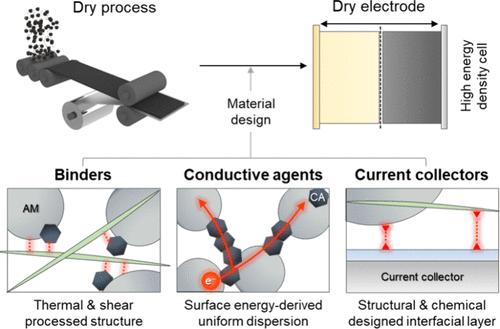当前位置:
X-MOL 学术
›
ACS Energy Lett.
›
论文详情
Our official English website, www.x-mol.net, welcomes your
feedback! (Note: you will need to create a separate account there.)
Material Challenges Facing Scalable Dry-Processable Battery Electrodes
ACS Energy Letters ( IF 19.3 ) Pub Date : 2024-10-31 , DOI: 10.1021/acsenergylett.4c01690 Nag-Young Kim, Jung-Hui Kim, Heejin Koo, Jihye Oh, Jung-Hyun Pang, Kyu-Dong Kang, Seong-Seok Chae, Jisup Lim, Kwan Woo Nam, Sang-Young Lee
ACS Energy Letters ( IF 19.3 ) Pub Date : 2024-10-31 , DOI: 10.1021/acsenergylett.4c01690 Nag-Young Kim, Jung-Hui Kim, Heejin Koo, Jihye Oh, Jung-Hyun Pang, Kyu-Dong Kang, Seong-Seok Chae, Jisup Lim, Kwan Woo Nam, Sang-Young Lee

|
Dry-processable electrode technology presents a promising avenue for advancing lithium-ion batteries (LIBs) by potentially reducing carbon emissions, lowering costs, and increasing the energy density. However, the commercialization of dry-processable electrodes cannot be achieved solely through the optimization of manufacturing processes or modifications of existing electrode components. Therefore, material innovation is urgently required for each of the core components of dry electrodes: binders, conductive agents, and current collectors. This Review explores recent advancements in these components, delving into their physicochemical roles and contributions. We identify critical performance factors and propose design strategies aimed at improving the functionality of electrode components and the overall performance of dry electrodes. This Review provides insights into the material innovations required to overcome current limitations and drive the sustainable advancement of LIB technology through dry electrode processes.
中文翻译:

可扩展的可干法加工电池电极面临的材料挑战
可干法加工电极技术通过潜在减少碳排放、降低成本和提高能量密度,为推进锂离子电池 (LIB) 提供了一条有前途的途径。然而,可干法加工电极的商业化不能仅通过优化制造工艺或修改现有电极组件来实现。因此,干电极的每个核心部件:粘合剂、导电剂和集流体都迫切需要材料创新。本综述探讨了这些成分的最新进展,深入研究了它们的物理化学作用和贡献。我们确定关键性能因素并提出旨在提高电极组件功能和干电极整体性能的设计策略。这篇评论深入探讨了克服当前限制并通过干电极工艺推动 LIB 技术的可持续发展所需的材料创新。
更新日期:2024-10-31
中文翻译:

可扩展的可干法加工电池电极面临的材料挑战
可干法加工电极技术通过潜在减少碳排放、降低成本和提高能量密度,为推进锂离子电池 (LIB) 提供了一条有前途的途径。然而,可干法加工电极的商业化不能仅通过优化制造工艺或修改现有电极组件来实现。因此,干电极的每个核心部件:粘合剂、导电剂和集流体都迫切需要材料创新。本综述探讨了这些成分的最新进展,深入研究了它们的物理化学作用和贡献。我们确定关键性能因素并提出旨在提高电极组件功能和干电极整体性能的设计策略。这篇评论深入探讨了克服当前限制并通过干电极工艺推动 LIB 技术的可持续发展所需的材料创新。


















































 京公网安备 11010802027423号
京公网安备 11010802027423号